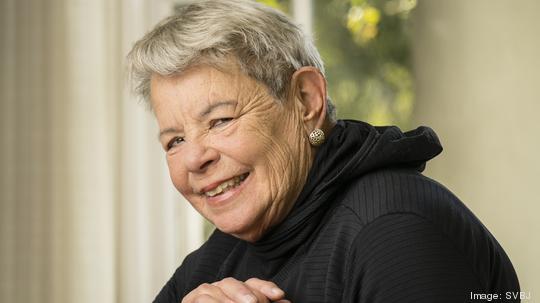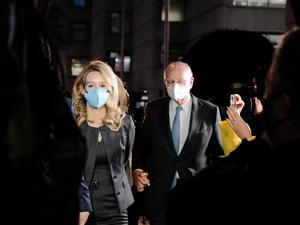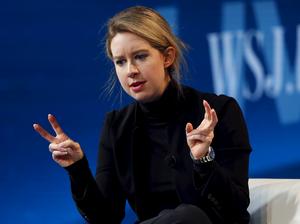
Years before Theranos founder Elizabeth Holmes was prosecuted for fraud, Dr. Phyllis Gardner saw right through her.
Gardner, a professor of medicine at Stanford University, first met Holmes in 2003 when the latter was still a student at Stanford. Holmes discussed with Gardner an initial version of the idea that led her to start Theranos — an arm patch that would both diagnose and treat patients' medical conditions.
Gardner told Holmes her idea would be impossible to implement. Holmes didn't seem to absorb Gardner's advice.
"She just obviously didn't want expertise of any kind," Gardner said. "She seemed to think she was very intelligent, which I didn't find her to be. I mean, I'm surrounded by Nobel laureates."
Even as Holmes attracted venture funding and fawning press coverage, Gardner remained skeptical, even critical. She got some measure of vindication earlier this month when a jury convicted Holmes of defrauding investors.
With Holmes now awaiting sentencing, the Business Journal reached out to Gardner to get her take on Holmes, the verdict and what students and aspiring entrepreneurs can learn from the Theranos founder's rise and fall. This interview has been edited for length and clarity.
What do you think about the Holmes verdict?
The length of (the deliberations) demonstrated it was quite a fair and thoughtful jury. They had direct evidence that she had committed fraud to investors. So they convicted her on a global count of fraud for investors.
With regard to patients, the judge did not allow (the prosecution) to talk about the effects of bad diagnostics. So the (evidence of) harm to patients was not that strong.
I think it was fair, and it's a pretty harsh sentence that can happen. Three of (the verdicts) suggest 20 years and one six years. That's a lot of time. The judge can take it down, which he probably will. It still will send a message to the public.
That's what I want — "Don't do this. Students: Do not ascribe to 'get rich quick, be billionaires.'" Try to do something good for people, really good, not some stupid idea that you have that doesn't work.
Do you think Theranos' rise and fall would have progressed differently if Holmes were a man rather than a woman?
No. I have stood for women all my life. Being a woman in a profession is like a salmon swimming upstream — it's hard. And I have gone through hardship myself, trust me. I also have stood up for women, mostly in the university, because it's very hard. Women students, everything.
But this was about fraud. This is about a person who's flawed. I think she got part of the way she was because she was a woman, because she was pretty, which is ridiculous and sexist in and of itself.
Were you ever taken in by Holmes' "reality distortion field," her ability to make people believe her fabrications?
I didn't find her compelling. Not at all. She was less than compelling to me. On the other hand, she seemed to be very compelling to a certain phenotype: men.
She had what I found to be an unrealistic sense of self, that she was highly intelligent and in control. I found her over the years to be completely amoral, a compulsive liar, with an overwhelming sense of self.
I railed about her for years. The only thing I can say is that I feel vindicated in the sense that she got convicted for part of this. And she got convicted of something that's very hard to prove: fraud.
John Carreyrou wrote in his book ("Bad Blood," which exposed Holmes' misrepresentations), when he signed it for me, "You smelled a rat." And I did. But I wasn't the only one. There were others.
Did you follow the growing media furor around Theranos up until the time it collapsed? Did Holmes' fame and success surprise you?
I did see it, and I did absolutely rail against it. You can ask my coworkers and my students, some of whom said, "Let's have Elizabeth Holmes speak in your class." I'd say "Not on my watch; she's not coming here." So I had supreme doubts all along.
I also noticed the change in her appearance: She became glamorous. Everybody asks me that, "Did she have that voice?" No. And also her appearance had changed dramatically. She'd gotten very glamorized, and she had a traveling entourage of makeup artists.
What does Holmes' rise and fall say about Silicon Valley's culture?
They call this all Silicon Valley, and that this is typical Silicon Valley. And it's not. It's an outlier. She's an outlier. I think Silicon Valley has a lot of hubris, but not this. This is fraud. And the medical industry does not have this.
She just was a liar. This is not common in medical industries, Silicon Valley or elsewhere. Everybody's saying, "Silicon Valley — fake it till you make it." Come on, you don't fake it till you make it. Just make it, in medicine.
But is there a part of the Theranos saga that does say something about Silicon Valley?
Too much reliance on "entrepreneurship," on desire for wealth early, desire for recognition. I think all those are part of the Silicon Valley culture. Please, put your effort, students, on things that will help the world.
And I gather you don't think Holmes was working on something like that.
The idea that you could do blood testing every day in your own home, what good is that going to do? Have you ever followed your own blood test? It doesn't change that much, and if it does change, you need to be with a doctor. You're not going to do anything yourself. The whole concept was flawed.
What lesson should students take away from Theranos?
I just want students to realize work is hard. Yeah, be inventive. But try to be inventive for the good of people, not for making yourself a billionaire. Don't aspire to Ferraris, because unfortunately a lot of them do. Realize it takes hard work, a grind, to be successful, to make things work. Don't lie, ever. And take responsibility. If you do something wrong, admit it. That's all. I mean, just be a good person.








